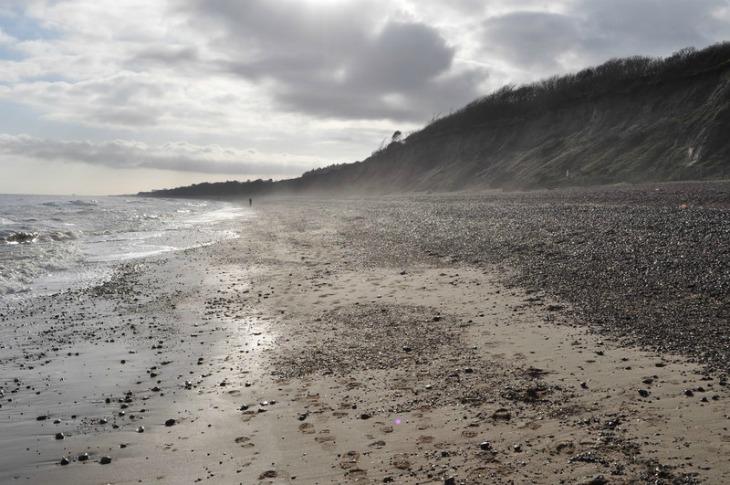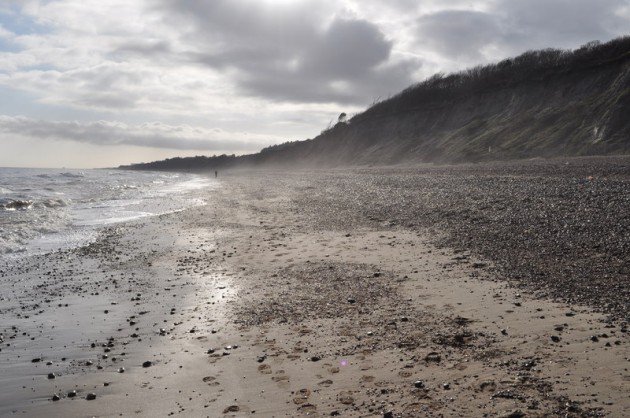In this three-part series, Orchard Times scribe Oscar Rickett investigates the history of Dunwich: Britain’s wannabe Atlantis. This is the third and final instalment. Here’s Part One and here’s Part Two.
Jumping Ship
In Dunwich they used to hold a “Service of the Waves” on the cliffs in the memory of Saint Felix and Sigeberht, two chaps who both remained pretty philosophical about the water’s inclination to ruin everything, over and over again. The people would thank the sea, blessing it and asking that it be benevolent and not come knocking on their doors and crashing through their windows.
Considering all the havoc it had wreaked, you almost feel that the people of Dunwich would want to curse the sea and tell it to back the fuck up. But we want to feel as though we have some control, we want to improve our odds and so we bless the sea and tell ourselves that if we behave well, it will too. Another mermaid story fromHolland, the “Mermaid of Edam”, describes the socialisation of a mermaid brought in from the sea. She ends up becoming a good Catholic and a productive member of her community. It’s as if the story is saying: the mermaid can do it, so maybe the sea will.
Other stories explore the dread we have of the sea. There is one from the provinceof Groningen. One morning a farmer draws water from the well for his cattle and sees a herring swimming in the bucket. He comes to the bizarre conclusion that the fish has swum through the land and up into the well, which means that the sea is undermining the land and will soon wash it away. The farmer plunges into an angry depression. He sells his farm and moves to higher ground. He can’t sleep and he spends his days staring out to sea. When the first storm of autumn comes, he is found dead in his barn. He hasn’t drowned, his misery has overcome him.
In Dunwich they tell a story about a ghost ship that attacked the town in 1803 and then left without a trace. In both stories, the sea is the aggressor, terrifying the population it holds at its mercy. (There is actually another ending to the Herring-Farmer story in which the whole town drowns and the farmer survives, presumably because he has gone to live on high ground. The message there being that if you are depressed and live near the sea, go with it: follow your depressed guy instinct and get up on a hill. Then you can see all your kinsmen drown and you know what? You might just feel better.)
Dutch stories about the sea are often gloomy and without much hope. After all, to give one example, the St. Elizabeth’s flood of 1421 destroyed seventy-two Dutch villages, so the stories are unlikely to be a walk in the park with the guy from the Grolsch adverts. But while there used to be a major flood in the Netherlands every decade during the middle ages, there were only two big ones in the twentieth century: 1916 in the aptly named Waterland and 1953 in the just as aptly named Zeeland (“Sealand”).
At Dunwich, the sea continues to take away a metre of land each year. On the East Yorkshirecoast two miles of land has been lost since the Norman invasion and the sea continues to eat away at the land. Climate change, with the flash floods it brings, only adds to this.
But back in Dunwich I can understand why people continue to want to live in these parts of the world. Sure, you might wake up one day to find your whole life floating out to sea with your wife and children, but up until then you will have had a deep-thinking fun old time of it by the sea. We never think we will be the ones to have to deal with any kind of catastrophe, natural ones included, and so we will go to a place where the odds of such a thing happening are that much higher and still not expect anything to happen.
The seafaring people who made their fortunes at the height of Dunwich’s success knew they were on to a good thing even if there was a small voice at the back of their mind telling them it might not last. They had the natural harbour, they had one over on Walberswick and they had the sea, which gave them what they needed until it took it all back. They could look at the sea and recognise the truth of Henry James’ words, written many centuries later, that theNorth Seamoves forever, “like a ruminating beast, an insatiable, indefatigable lip”. But they would have known this truth, also from James:
If at low tide you walk on the shore, the cliffs, of little height, show you a defence picked as bare as a bone … [The land] stretched, within historic times, out into towns and promontories for which there is now no more to show than the empty eye-holes of a skull; and half the effect of the whole thing, half the secret of the impression, and what I may really call, I think, the source of the distinction, is this very visibility of the mutilation. Such at any rate is the case for a mind that can properly brood. There is a presence in what is missing — there is history in there being so little. It is so little, to-day, that every item of the handful counts… I defy anyone, at desolate exquisite Dunwich, to be disappointed in anything.

